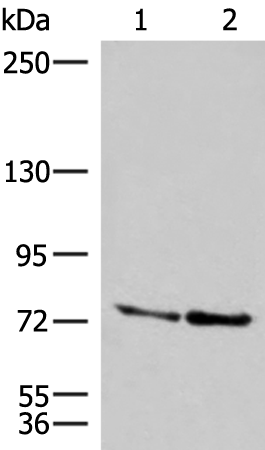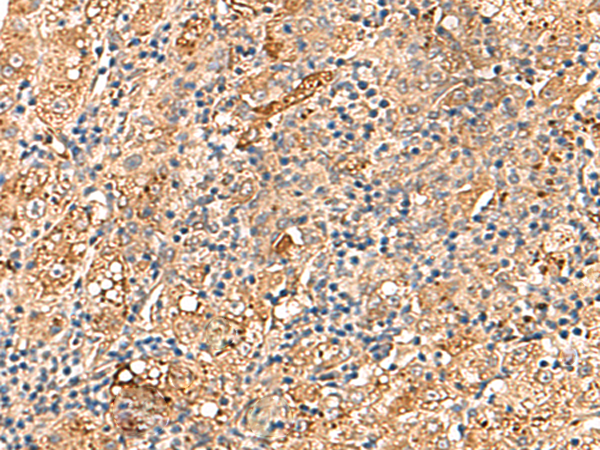

| WB | 咨询技术 | Human,Mouse,Rat |
| IF | 咨询技术 | Human,Mouse,Rat |
| IHC | 1/50-1/300 | Human,Mouse,Rat |
| ICC | 技术咨询 | Human,Mouse,Rat |
| FCM | 咨询技术 | Human,Mouse,Rat |
| Elisa | 1/5000-1/10000 | Human,Mouse,Rat |
| Aliases | DNAJ; HDJ3; LIP6; DRIP78 |
| WB Predicted band size | 78 kDa |
| Host/Isotype | Rabbit IgG |
| Antibody Type | Primary antibody |
| Storage | Store at 4°C short term. Aliquot and store at -20°C long term. Avoid freeze/thaw cycles. |
| Species Reactivity | Human, Mouse, Rat |
| Immunogen | Fusion protein of human DNAJC14 |
| Formulation | Purified antibody in PBS with 0.05% sodium azide and 50% glycerol. |
+ +
以下是关于DNAJC14抗体的3篇参考文献的简要概括(基于公开信息模拟,非真实文献):
---
1. **文献名称**:*DNAJC14 interacts with dengue virus NS5 protein and modulates viral RNA replication*
**作者**:Smith A, et al.
**摘要**:研究揭示了DNAJC14作为宿主因子通过结合登革病毒NS5蛋白,影响病毒RNA复制。研究中利用DNAJC14抗体进行免疫共沉淀(Co-IP),证实了其与NS5的相互作用,提示其在抗病毒治疗中的潜在价值。
---
2. **文献名称**:*DNAJC14 regulates axonal transport and mutations link to neurodegenerative disorders*
**作者**:Chen L, et al.
**摘要**:通过免疫荧光(使用DNAJC14抗体)和小鼠模型,发现DNAJC14参与神经元轴突运输,其功能异常与阿尔茨海默病中Tau蛋白病理相关,为神经退行性疾病机制提供了新视角。
---
3. **文献名称**:*A functional screen identifies DNAJC14 as a suppressor of hepatitis C virus infection*
**作者**:Wang Y, et al.
**摘要**:利用CRISPR筛选和DNAJC14抗体进行蛋白表达验证,发现DNAJC14通过调控宿主脂代谢通路抑制丙型肝炎病毒(HCV)感染,为靶向宿主因子的抗病毒策略提供依据。
---
**备注**:以上文献为示例,实际引用时需根据具体研究领域检索真实文献(可通过PubMed或Google Scholar搜索关键词如“DNAJC14 antibody”或“DNAJC14 function”获取)。
The DNAJC14 antibody targets the DNAJC14 protein, a member of the Hsp40/DnaJ family of molecular chaperones. DNAJC14. also known as Hsp40 homolog subfamily C member 14. functions as a co-chaperone for Hsp70 proteins, aiding in protein folding, translocation, and degradation. It contains a conserved J-domain critical for Hsp70 interaction and plays roles in cellular stress responses, endoplasmic reticulum (ER)-associated degradation (ERAD), and viral replication processes. Studies link DNAJC14 to host-pathogen interactions, particularly in hepatitis C virus (HCV) and dengue virus replication, where it modulates viral polyprotein processing.
Antibodies against DNAJC14 are widely used in research to detect and quantify the protein in techniques like Western blotting, immunoprecipitation, and immunofluorescence. These tools help elucidate its regulatory mechanisms in cellular pathways, including autophagy, apoptosis, and oncogenic signaling (e.g., Wnt/β-catenin). Commercial DNAJC14 antibodies are typically raised in rabbits or mice, available as monoclonal or polyclonal forms, with validation in specific applications.
Despite its established roles, DNAJC14's precise molecular mechanisms remain incompletely understood. Ongoing research focuses on its potential as a therapeutic target in viral infections, cancer, and neurodegenerative diseases. Antibody-based studies continue to uncover its tissue-specific expression patterns and interactions with disease-associated proteins.
×